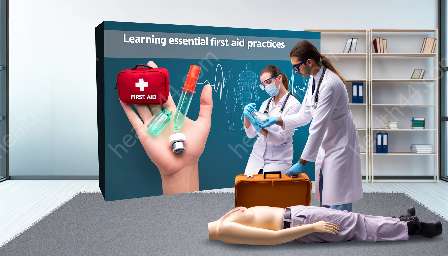Medical research methodology is a fundamental component of advancing healthcare knowledge and improving patient outcomes. It plays a pivotal role in shaping health education, medical training, and overall public health strategies. In this guide, we will delve into the complexities of medical research methodology, its significance in the healthcare landscape, and its implications for evidence-based practice. By the end of this exploration, you will have gained a deep understanding of how research methodologies drive progress in the field of medicine.
The Significance of Medical Research Methodology
Before delving into the intricacies of medical research methodology, it is essential to understand its significance in the realm of healthcare and beyond. Research methodology in the medical field involves systematic investigation, analysis, and interpretation of data to uncover new knowledge, enhance existing theories, and ultimately improve healthcare practices. This process provides the evidence base for medical decision-making, contributes to advances in treatments and diagnostics, and informs health policies and guidelines.
Moreover, medical research methodology extends its reach to health education and medical training. As aspiring healthcare professionals, educators, and researchers, understanding the principles and techniques of rigorous research methodology is crucial for integrating evidence-based practices into daily healthcare activities. By comprehending research methodologies, individuals involved in health education and medical training can effectively disseminate the latest research findings, teach critical appraisal of scientific literature, and equip future professionals with the skills to apply evidence-based approaches in their practice.
Components of Medical Research Methodology
Medical research methodology encompasses a diverse array of components, each essential for ensuring the validity and reliability of research outcomes. These components include:
- Data Collection: The process of gathering information or observations relevant to the research question or hypothesis. Methods may include surveys, interviews, laboratory experiments, clinical trials, or observational studies.
- Study Design: The blueprint for conducting research, which involves selecting appropriate study populations, defining variables, and choosing the most suitable research approach, such as randomized controlled trials, cohort studies, case-control studies, or qualitative research methods.
- Data Analysis: The systematic examination of collected data to extract meaningful insights, detect patterns, and draw valid conclusions. Techniques range from statistical analyses to qualitative thematic analysis, depending on the nature of the research.
- Ethical Considerations: Upholding ethical standards and protecting the rights and well-being of research participants. This involves obtaining informed consent, ensuring privacy and confidentiality, and adhering to ethical guidelines set forth by institutional review boards and regulatory bodies.
- Literature Review: The critical examination and synthesis of existing research and scholarly articles related to the topic of interest. A thorough literature review forms the foundation for identifying gaps in knowledge and justifying the research's significance.
Designing Valid and Reliable Research Studies
One of the foundational goals of medical research methodology is to design studies that produce valid and reliable results. Validity ensures that the research study measures what it intends to measure, while reliability ensures that the results are consistent and replicable. Achieving validity and reliability involves careful attention to various aspects of the research process:
- Clear Research Objectives: Defining specific, measurable, achievable, relevant, and time-bound research objectives that align with the study's overarching purpose.
- Selection of Appropriate Measures: Choosing reliable and valid measurement tools, including questionnaires, instruments, or biomarkers, that effectively capture the intended outcomes or variables.
- Sampling Techniques: Employing appropriate sampling methods to ensure that the study population is representative of the target population, thus enhancing the generalizability of the study findings.
- Minimizing Bias: Implementing strategies to minimize biases, such as selection bias, measurement bias, and confounding variables, which can impact the accuracy and validity of research findings.
- Robust Data Analysis: Using rigorous statistical and qualitative methods to analyze and interpret data, allowing for the identification of meaningful patterns and relationships.
Interpreting and Applying Research Findings
Once the research study is completed, the interpretation and application of findings are crucial steps that bridge the gap between research and practice. Understanding how to interpret research findings and translate them into actionable insights is essential for informed decision-making and evidence-based practice in healthcare and other related fields. Key considerations include:
- Statistical Significance: Assessing the statistical significance of research findings to determine whether the observed results are likely to be due to chance or represent true associations.
- Practical Significance: Evaluating the practical implications of the research findings, including their relevance to clinical practice, public health, health policies, or future research directions.
- Dissemination of Findings: Effectively communicating research findings through peer-reviewed publications, conference presentations, policy briefs, or other platforms to reach diverse audiences, including healthcare professionals, policymakers, and the general public.
- Integration into Practice: Translating research findings into practice by incorporating evidence-based recommendations into clinical guidelines, educational curricula, public health interventions, or healthcare policies.
Challenges and Innovations in Medical Research Methodology
As research methodologies continue to evolve, new challenges and innovations shape the landscape of medical research. From addressing ethical considerations in emerging areas of research to harnessing the potential of advanced technologies for data collection and analysis, staying abreast of these developments is essential for conducting impactful and ethical research. Some key challenges and innovations include:
- Big Data and Artificial Intelligence: Leveraging big data analytics and AI-driven technologies to derive deep insights from large datasets, enabling new avenues for medical research and personalized healthcare.
- Ethical Considerations in Genomic Research: Navigating ethical challenges inherent in genomic research, including privacy concerns, consent issues, and the responsible use of genetic information for healthcare advancements.
- Community-Engaged Research: Engaging communities in the research process and co-creating knowledge to address health disparities, enhance community health, and ensure the relevance of research to diverse populations.
- Translational Research: Bridging the gap between basic research discoveries and their application in clinical settings, accelerating the translation of scientific advancements into tangible benefits for patients.
- Global Collaboration and Partnerships: Embracing international collaboration and interdisciplinary partnerships to tackle global health challenges, share resources, and foster a collective approach to groundbreaking research endeavors.
Conclusion
Medical research methodology serves as the cornerstone of evidence-based healthcare, propelling advancements in medical knowledge, practice, and public health initiatives. By understanding the complexities and significance of research methodologies, individuals in the healthcare and education domains can contribute to the generation of robust evidence, the dissemination of critical findings, and the translation of research into meaningful actions that improve health outcomes for individuals and communities worldwide.

















